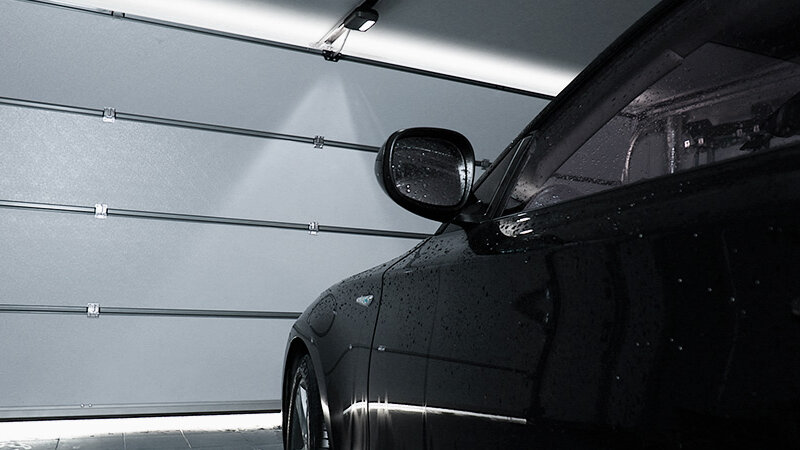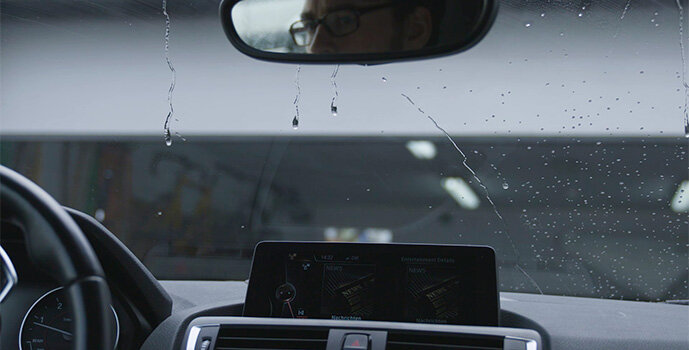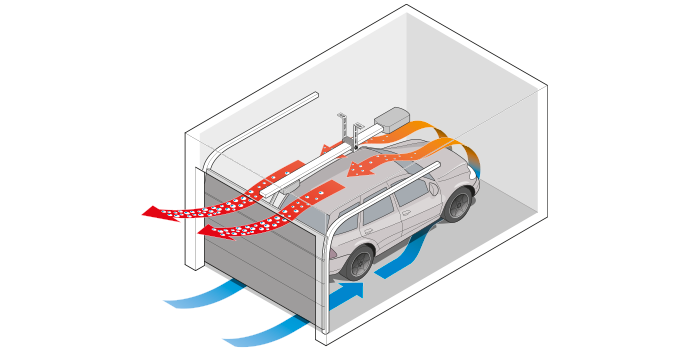- Ventilating the garage: prevent humidity and mould
- Why does mould form in the garage?
- How high should the air humidity in the garage be?
- How can I remove mould in the garage?
- Preventing mould in the garage with correct ventilation
- Ventilating your garage correctly with Senso
- Intelligent garage door operators from SOMMER

Ventilating the garage: prevent humidity and mould
A garage protects cars, bicycles and gardening equipment against vandalism, theft and the elements. Particularly in the winter months, snow or rainwater can cause condensation to accumulate on the floor, the walls, the garage door or ceiling. Excessively high air humidity leads to rust damage or mould in the garage. To prevent or remove mould, garage owners should air the garage regularly.
Why does mould form in the garage?
In most cases, mould in the garage is caused by inadequate ventilation. Like all other closed rooms, garages should be ventilated regularly and thoroughly. Mould in the garage can also be caused by:
- A lack of or defective insulation
- Blocked or damaged roof drainage systems
- Leaks in the walls or ceiling
- Wet vehicles
- No air circulation in the garage due to lack of ventilation

How high should the air humidity in the garage be?
The air humidity in the garage can be measured using a hygrometer. Ideally, the air humidity should lie between 50 and 55 per cent. In the winter months, when wet vehicles are parked in the garage, the air humidity is often far above the ideal values.
How can I remove mould in the garage?
If there is already mould in the garage, it should be removed immediately. While a specialist company should be consulted to remove heavy mould infestations, smaller patches can be tackled using a mould remover. When doing so, it is important to wear breathing protection and gloves. This prevents you breathing in mould spores and contact with the skin. As additional protection against the formation of mould in the garage, you can apply anti-mould paint. In any case, you should ensure that there is a circulation of air in the garage with a garage ventilation system.
Preventing mould in the garage with correct ventilation
The garage needs to be ventilated regularly in order to regulate the air humidity. The Senso additional equipment from SOMMER offers a particularly convenient way of doing this. The humidity sensor measures the temperature and air humidity in the garage. If necessary, the motor carriage of the garage door operator automatically opens the door slightly, ensuring perfect air circulation. When the optimum value is reached, the door is closed, reducing the risk of mould formation.

The humidity sensor is compatible with the garage door operators SOMMER base+ and SOMMER pro+. The Senso is simply plugged into the control unit in the motor carriage.
Ventilating your garage correctly with Senso
In our video, we show you how the Senso humidity sensor works and how easy it is to install it on a garage door operator from SOMMER.
Intelligent garage door operators from SOMMER
Our garage door operators are equipped with the travelling motor operator system developed by SOMMER. That makes them especially smooth-running and durable. In addition, the garage door operators are completely maintenance-free and easy to retrofit. The intelligent motor carriage offers plenty of space for the connection of accessories such as a humidity sensor, an alarm buzzer, a parking position laser, Smart Home solutions and much more.